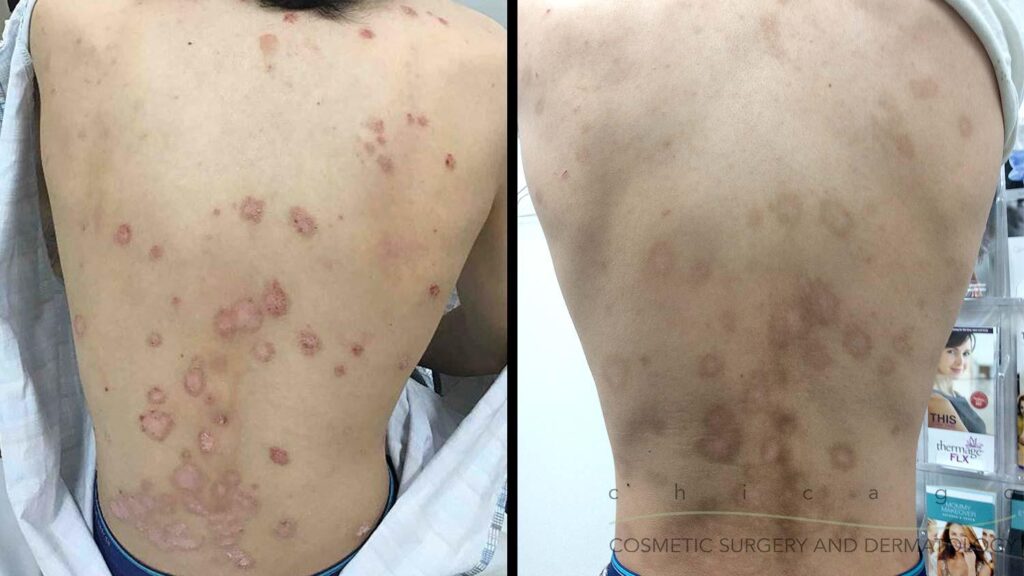Psoriasis
What is Psoriasis?
Unfortunately, there is currently no cure for psoriasis. However, our experienced providers can find the right treatment plan for you to help control your psoriasis flares.
How to control Psoriasis flares?
In most cases, psoriasis is mild and limited to a few body area. Sometimes patients clear spontaneously. For patients with persistent or itchy psoriatic lesions, many medications are available including topical steroids, tars, Vitamin D creams, and Retinoid gels. More severe psoriatic patients often use biologic injectables, oral retinoids (acitretin, isotretinoin) or immune system medications such as Methotrexate and Cyclosporine. Light therapy is also used to control psoriasis.
Steroids: Topical steroids have been used for decades to control the redness and itching of psoriasis.
There are many strengths and brands of steroids to use. Patients should be cautious in using the medications only when the condition flares, as daily use over months can render the skin unresponsive to the medication, and in theory, can thin the skin. They should not be used more than 3-4 weeks at a time without taking a 1 week break. Patients need to be aware of the strength of their steroid because high potency steroids should not be used on the face, on children, or in large body areas as it may lead to systemic absorption. Occasionally, oral or injected steroids are used for rapid, but short term control of psoriasis. Side effects such as weight gain, osteoporosis, glaucoma, and diabetes may occur with long term systemic steroid use.
Vitamin D₃ Creams: Cacipotriene or calcipotriol (Vectical) are available by prescription and have been shown to help control psoriasis. Many patients will use them in combination with topical steroids, or alone as a steroid sparing agent. Vitamin D₃ will not cause thinning of the skin. Combination Vit D and steroid cream products, Taclonex and Enstilar can be used once a day, for up to 4 weeks at a time.
Topical Retinoids: Tazarotene (Tazorac) gel is a vitamin A derivative which has been shown to reduce the scaling and redness of psoriasis. It also can be used in combination with steroids or alone. Irritation is the main side effect, and it should not be used on thin or sensitive skin, such as the groin.
Medicated Shampoos: For patients with scalp psoriasis, daily hair washing is helpful.
There are 5 types of medicated shampoos which can control the flaking and itching on the scalp: Tar, Salicylic or Glycolic acid, Selenium Sulfide, Zinc Pyrithione and clobetasol. Tar shampoos include Neutrogena T-Gel, DHS Tar, and others. Salicylic or glycolic acid shampoos include Salex, Neutrogena T-Sal. Selenium sulfide shampoos include Head and Shoulders (blue bottle) and Desonex. Zinc Pyrithyione shampoos include Head and Shoulders (white bottle). Prescription Clobetasol shampoo (a steroid) can be applied for 5 minutes then lathered and rinsed. Patients may use any preferred conditioner afterwards.
Oral Medications: Oral therapy can be used to control severe psoriasis. Three main medications are used: Acitretin (Soriatane), Methotrexate, and Cyclosporine (Neoral). Each requires close physician supervision and blood monitoring. Side effects such as hair loss and liver dysfunction are uncommon, but can occur. Female patients of childbearing age, and persons who drink alcohol are not candidates for these medications. Otezla is an immune modifier which can be used daily, even in women of child bearing potential or those who drink alcohol.
Phototherapy: Specific light box therapy with UVA or UVB rays can be used to decrease psoriasis. Excessive sun exposure or sunburn can lead to aggravation of psoriasis.
Biologics: These suppressants of psoriasis inflammation are available to create prolonged remission from psoriasis. These medications require at home injections for administration and are meant for patients with moderate to severe psoriasis, or those with psoriatic arthritis. Enbrel, Humira, and Stelara are TNF inhibitors. Taltz, Cosentyx, Simponi, and Cimzia decrease other inflammatory mediators of psoriasis. Ask your doctor if you are a candidate.
Omega 3 Fatty Acids: This potent anti-inflammatory nutraceutical can help to improve psoriatic skin, as well as benefit your overall health. Omega 3’s (fish oil or algae based) are taken daily (2000mg a day).
Is there a cure for Psoriasis flares?
Unfortunately, there is currently no cure for psoriasis, but research has given us some great new treatments to control it. Most patients are able to control their condition and improve their skin. Close follow up with your provider is important as trying different treatment plans may be necessary to find the right treatment plan for you.
Call our office today to schedule your appointment to find treatment options that are right for you.





